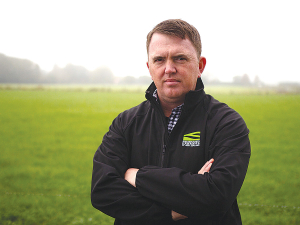Hawke’s Bay sheep and beef farmers warned to monitor stock water wells
Sheep and beef farmers in Hawke's Bay are being urged to keep a close eye on the wells that supply water to their stock.
 Federated Farmers national president Wayne Langford accuses Greenpeace of being an anti-farming lobby group who want to see the end of productive agriculture in New Zealand.
Federated Farmers national president Wayne Langford accuses Greenpeace of being an anti-farming lobby group who want to see the end of productive agriculture in New Zealand.
OPINION: Greenpeace Aotearoa are nothing but an anti-farming lobby group who want to see the end of productive agriculture as we know it in New Zealand.
That’s not an accusation I make lightly, but when I look back at Greenpeace’s recent statements and actions, it’s the only logical conclusion I can come to.
Time and time again, Greenpeace have shown there is nothing NZ farmers could do to improve environmental outcomes or sustainability that would ever be enough to please them. They’ve also made it clear they couldn’t care less about facts, science, or evidence if it doesn’t fit their anti-farming narrative.
Instead, they are totally fixated on an impractical plan to ‘halve the herd’ and ‘ban synthetic fertiliser’ that is completely removed from reality. Those slogans might look good on a bumper sticker, but in practice they would completely undermine New Zealand’s food production, rural communities and the wider economy.
If you’re looking for evidence behind my claims, you need look no further than in November last year when Fonterra announced a bold plan to reduce their emissions intensity 30% by 2030. NZ farmers are already the most carbon-friendly farmers in the world, and Fonterra’s new target is asking them to go even further – so that’s going to be a real challenge.
But before the dust had even settled, Greenpeace were climbing into Fonterra, claiming the targets weren’t credible, didn’t go far enough, and lacked ambition.
The trouble for Greenpeace is that Fonterra’s targets were set through the independent and internationally recognised Science Based Targets Initiative. This organisation helps companies set clearly defined and scientifically robust targets to reduce emissions in line with goals of the Paris Agreement – limiting global warming to 1.5°C.
True environmentalists would have welcomed such strong leadership from New Zealand farmers, but Greenpeace aren’t true environmentalists. Instead, they were the first to criticise. Nothing Fonterra could have announced would have been good enough for Greenpeace because they’re anti-farmer and anti-science.
Unfortunately, this isn’t the first time I’ve had to publicly call Greenpeace out on behalf of Kiwi farmers. In fact, it’s not even the first time this year. In May they were caught out spreading harmful misinformation that there is a link between nitrates in water and colorectal cancer.
This was a new low for Greenpeace, who were preying on people’s fear of cancer to divide communities and push their anti-farming agenda. They were misleading the public by basing their claims on a single Danish correlation study rather than what the international body of scientific evidence shows.
Advice on this issue should be coming from health professionals, not environmental activists. Greenpeace aren’t remotely qualified on the subject and their claims are wildly out of step with what credible sources like the World Health Organisation, Bowel Cancer New Zealand, the Prime Minister’s Chief Science Advisor, and leading colorectal surgeons are saying.
I want to be very clear that nobody is disputing we have a water quality issue in this country. There are plenty of good reasons for us to be working to reduce nitrates in waterways, but Greenpeace’s misinformation isn’t one of them.
Farmers are well aware they need to make changes and have been working hard in their communities and catchments for over a decade to improve environmental outcomes. We’ve fenced and planted waterways to exclude cattle and absorb nutrients, and we’re now a lot more precise with the way we use fertiliser, which means we use less of it.
It’s a complex challenge and farmers are doing all the right things, but it takes a long time for nitrate-rich water to work its way through the groundwater system. It will take time for us to start to see the fruits of our improvements, but I’m confident we are heading in the right direction and will see results.
Until then, Greenpeace need to be held accountable for the accuracy of their claims and the information they share with the public that causes needless stress, anxiety, confusion, and division.
New Zealanders liked Greenpeace a lot more when they stuck to saving whales. They should get back to that and stop slagging off our world-leading farmers.
Wayne Langford is national president of Federated Farmers.
Norwood has announced the opening of a new Tasman dealership at Richmond near Nelson next month.
Buying or building a rural or semi-rural property? Make sure you know where the wastewater goes, says Environment Canterbury.
With collars on more than seven million cows worldwide, Nedap says its standalone launch into New Zealand represents world-leading, reliable and proven smart technology solutions for dairy farmers.
The Meat Industry Association (MIA) is once again looking for game-changing ideas for New Zealand's red meat processing and exporting sector.
Environment Southland is inviting feedback on two bylaws that play a critical role in safeguarding the region's waterways and ensuring the safety of the local community.
While the North Island is inundated with rain, Southland is facing receding water levels as warm weather and lack of rainfall continues.

OPINION: Meanwhile, red blooded Northland politician Matua Shane Jones has provided one of the most telling quotes of the year…
OPINION: This old mutt has been around for a few years now and it seems these ‘once in 100-year’ weather…